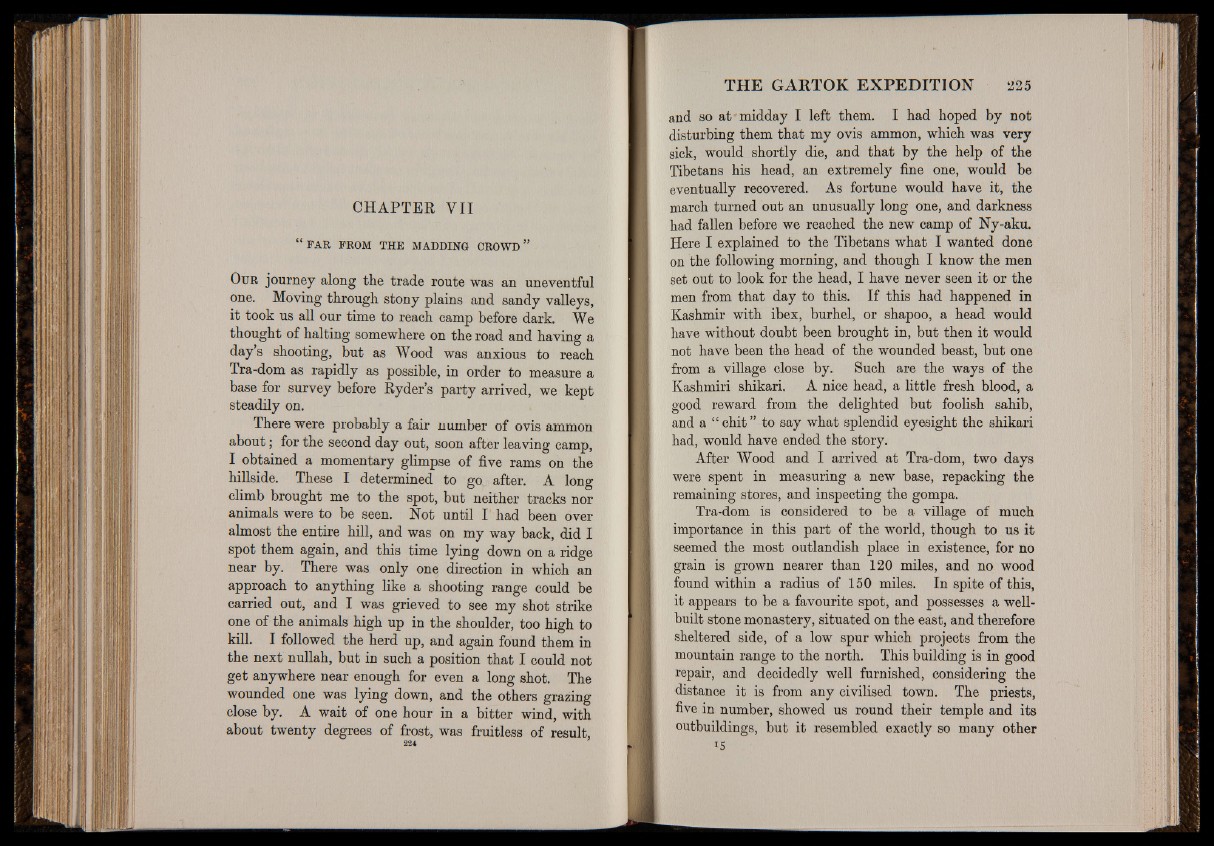
CHAPTER V II
“ f a r f r o m t h e m a d d i n g c r o w d ”
Our journey along the trade route was an uneventful
one. Moving through stony plains and sandy valleys,
it took us all our time to reach camp before dark. We
thought of halting somewhere on the road and having a
days shooting, but as Wood was anxious to reach
Tra-dom as rapidly as possible, in order to measure a
base for survey before Ryder’s party arrived, we kept
steadily on.
There were probably a fair number of ovis ammon
about; for the second day out, soon after leaving camp,
I obtained a momentary glimpse of five rams on the
hillside. These I determined to go after. A long
climb brought me to the spot, but neither tracks nor
animals were to be seen. Not until I had been over
almost the entire hill, and was on my way back, did I
spot them again, and this time lying down on a ridge
near by. There was only one direction in which an
approach to anything like a shooting range could be
carried out, and I was grieved to see my shot strike
one of the animals high up in the shoulder, too high to
kill. I followed the herd up, and again found them in
the next nullah, but in such a position that I could not
get anywhere near enough for even a long shot. The
wounded one was lying down, and the others grazing
close by. A wait of one hour in a bitter wind, with
about twenty degrees of frost, was fruitless of result,
224
and so at midday I left them. I had hoped by not
disturbing them that my ovis ammon, which was very
sick, would shortly die, and that by the help of the
Tibetans his head, an extremely fine one, would be
eventually recovered. As fortune would have it, the
march turned out an unusually long one, and darkness
had fallen before we reached the new camp of Ny-aku.
Here I explained to the Tibetans what I wanted done
on the following morning, and though I know the men
set out to look for the head, I have never seen it or the
men from that day to this. If this had happened in
Kashmir with ibex, burhel, or shapoo, a head would
have without doubt been brought in, but then it would
not have been the head of the wounded beast, but one
from a village close by. Such are the ways of the
Kashmiri shikari. A nice head, a little fresh blood, a
good reward from the delighted but foolish sahib,
and a “ chit” to say what splendid eyesight the shikari
had, would have ended the story.
After Wood and I arrived at Tra-dom, two days
were spent in measuring a new base, repacking the
remaining stores, and inspecting the gompa.
Tra-dom is considered to be a village of much
importance in this part of the world, though to us it
seemed the most outlandish place in existence, for no
grain is grown nearer than 120 miles, and no wood
found within a radius of 150 miles. In spite of this,
it appears to be a favourite spot, and possesses a well-
built stone monastery, situated on the east, and therefore
sheltered side, of a low spur which projects from the
mountain range to the north. This building is in good
repair, and decidedly well furnished, considering the
distance it is from any civilised town. The priests,
five in number, showed us round their temple and its
outbuildings, but it resembled exactly so many other
15